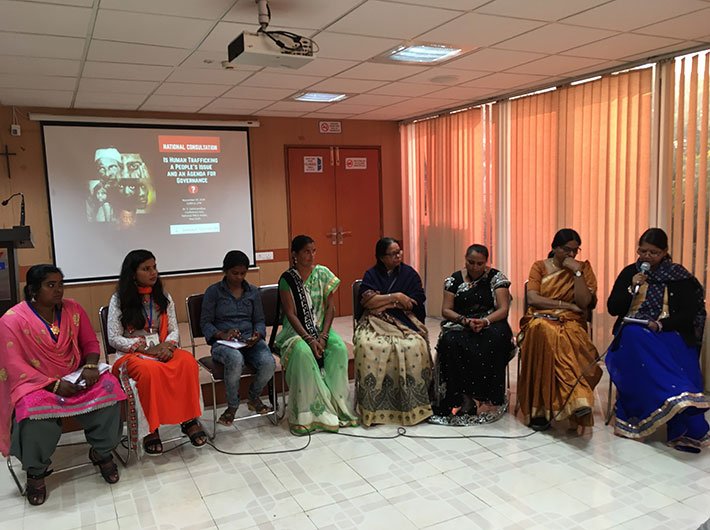Human trafficking victims narrate their ordeal at an event organised by Sankalp Foundation
“We are nobody’s concern. We are not part of any election manifesto, or any state government,” says 28-year-old Farah from Mahasamund district, Chhattisgarh. Five years ago, Farah was rescued by an anti-human trafficking NGO in Maharashtra. She used to work in a bangle-making industry.
Like most migrants in her state, Farah lives in the eastern part of Chhattisgarh, but has migrated to Raipur district in search of work. Despite migrating within the same state Farah was not able to vote in the recent assembly elections. The polling booth assigned to her was near her home in Mahasamund district. But she was not able to cast her vote as it was difficult for her to travel all the way from Raipur district to Mahasamund district.
This is the story of most of the human trafficking survivors and migrants from the poll-bound state of Chhattisgarh, Madhya Pradesh, Rajasthan, Telangana and Mizoram. They are angry as human trafficking is not a concern for many political parties and issues around it do not even feature in any party’s election manifesto.
Recently, survivors of human trafficking narrated their ordeals at an event organised by the Sankalp Foundation. The event was organised to discuss if human trafficking is an issue and agenda for governance for poll-bound states.
Manju Gardia, founder, Jan Jagriti Kendra – a Chhattisgarh-based NGO working with human trafficking victims – says that nearly one lakh people leave their native district in Chhattisgarh to work as migrant and bonded labourers in another districts. She further says that around 47 percent of the state population is living below the poverty line, but the state government, as well as opposition parties, fails to talk about these people in election manifestos.
After analysing the election manifestos of the BJP and Congress and what these parties offer for human trafficking survivors in Chhattisgarh, Atindriyo Chakrabarty, an advocate, says, “Tackling crimes against women, including sexual offences, have featured in manifestos of all major political parties. The ruling party BJP promises latest technological utilities in all police stations to aid investigation, while the opposition party Congress promises of active enforcement of law for enhancing women’s security, steps to tackle crimes against women, stringent action against the offenders, and setting up of Mahila Thana”.
“Labour trafficking is surging in Chhattisgarh, but sadly it’s not a priority of governance in the state,” adds Gardia.
Telangana has the fourth highest number of cases registered for human trafficking. But its ruling party, Telangana Rashtra Samiti (TRS) continues with its old manifestos, which were made in 2013, says social worker Sumitra from Ankuram NGO. “TRS manifesto focuses on waiving off the farmer’s loan, unemployment, the increment of pension for BPL widows and single women, giving money to the parents whose daughters are to get married and women & child welfare, including on SHG-s. Congress’s manifesto features widow pensions. TDP has also promised a manifesto in which a common minimum programme has been envisaged. The BJP, in its manifesto, has identified alcoholism as the key factor behind atrocities against women and has promised to regulate and restrict the sale of liquor in the state,” says Sumitra.
The Telangana government has no women cabinet minister; ironically their manifesto reads “all opportunities…for women development, empowerment…”
JR Sharan of Sankalp Foundation, says, “Efforts to combat human trafficking have been conventionally led by the departments of women and child development, social welfare and the police, supported by a few NGOs who run shelters and focus on rescue and rehabilitation services. But increasingly, the question that arises is that if all poor and underprivileged families are vulnerable to trafficking, especially women and children, does it get recognised as a people’s issue or a mainstream governance issue?”
“It is time that political parties should rise above their populist agendas and make issues like human trafficking as their political agendas,” he adds.



